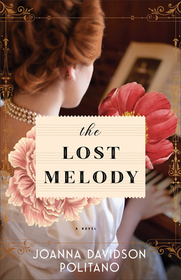While I certainly would love to gush over the prose, the plot, and the characters, I do not want to give even a hint of a spoiler because there are so many facets of this book that are twined together. However, I will say that if you are fan of classical music or Victorian history, this book deserves a place on your shelf. You will savor every single page with a heart of compassion for the lost souls that live in this asylum and for those who blindly believe their actions are worthy.
My rating: 5 of 5 stars
Wrongfully confined to a Victorian mental asylum, a former concert pianist desperately tries to convince someone she's not mad!
The Lost Melody was a dark yet exciting historical Christian fiction novel about mental health care and treatment during the 1800s. The asylum storyline and setting are the stuff of nightmares: a creaking old building situated on the edge of the moors, barred doors and windows, hidden passageways, dimly-lit wards with confused and suffering patients, a crumbling tower off-limits to staff, all within view of a well-populated cemetery on the grounds. The main character must even hide in a morgue at one point!
When the story opens, Vivienne is relieved by her father's death; he'd been something of a tyrant. She's an angry young woman, and with good reason. Her father had been an abusive and harsh autocrat, taking the parenting style of the time to an extreme. She's just gotten out from under his thumb only to discover she's got a manager with an agenda that doesn't align with her own. This dissonance led to a gripping novel filled with plot twists and shocking surprises that kept me turning the pages to find out how it would turn out.The author uses light and dark imagery throughout the story with beautiful results. Within the asylum setting, hope struggles with hopelessness, and dark, gaslit corridors are juxtaposed with the chandelier-bright conservatory. Candles and matches are Vivienne's only items within her control. Light and dark even plays a role in characterization, with some representing light and others darkness while still others actively suck the very light out of the lives of those left to disappear into the asylum.
With its gripping plot, superb storytelling, and sympathetic and engaging characters, I recommend THE LOST MELODY to readers of historical fiction, especially those who are interested in Victorian-era asylums, the treatment and care of mental health patients in the 1800s, and the beginnings of music therapy in mental health settings.I voluntarily reviewed this after receiving an Advanced Review Copy from the author through NetGalley and Lone Star Book Blog Tours.
I have read several fiction books depicting the lives and treatment of those living in what was referred to as lunatic asylums during the 1800's. I have even read Nellie Bly's, âTen Days in a Mad-houseâ. None of these books came even close to giving the true picture of what these inmate's lives were like, but Ms. Politano captures it all in this novel.
She exposes the unjust, raw nightmare conditions of those who fell victim of these establishments. Many inmates would become lifetime prisoner simply by someone's accusation or assumption that they were mentally ill. Sadly family members were often the culprit just wanting to rid themselves of the person. Some simply suffered from health problems. I was grieved at the inhumane treatment and hopelessness of these poor souls.
The story is powerful. I could not read it at long stretches and especially not before going to bed. All in the entire story is one of perseverance in the face of great hardship. Vivienne's faith, and belief she would escape even with such physical and mental abuse was inspirational. I loved the surprise ending.
I received this book from LibraryThing and Revell Publishing in exchange for an honest review. The opinions stated are my own.




